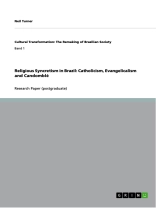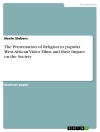Research Paper (postgraduate) from the year 2011 in the subject Ethnology / Cultural Anthropology, grade: Fieldwork, Denver Institute of Urban Studies (-), language: English, abstract: ABSTRACT
What follows is an attempt to examine cultural factors, not by arranging abstracted entities into unified patterns but by taking into account the cultural forms by means of which Brazilians communicate, perpetuate and develop their attitudes toward life. As a result, this paper addresses the formations of social phenomenon as it relates to religion in Brazil but within the context of people living out their daily lives. Notwithstanding, it might be said that this work is unscientific in that it contains impressions, feelings and emotions expressed in a narrative form. For the social sciences have longed ago prohibited writing in the first person in scientific reporting and the insertion of my own direct experiences would only tend to corrupt any attempt at objectivity. However, I have chosen to incorporate a reflective, dialogic approach that proclaims an appreciation of the fieldwork experience rather than conduct formal interviews in controlled settings or use second hand materials as a primary source.
About the author
Neil Turner is an American anthropologist living in Salvador, Bahia, Brazil. He holds a Ph.D. and a M.A. in Anthropology. While in the USA, Dr. Turner worked as a research analyst for the American College of Physicians (1992 – 2002), and he has worked as a computer information technician for the oldest law practice in the United States, Rawle & Henderson (2005 – 2007). As a professor, he has taught at Tufts University, Boston, MA., California State University, Los Angeles, CA and as an adjunct professor at American Pathways University, Denver, CO. Dr. Turner has authored several papers and his work has been published by Grin Publishers, Munich, Germany. Also, his work has appeared in the Italian online journal for anthropology, Antrocom. Currently, he is teaching ESL, TOEFL, developing educational software for the computer and conducting ethnographic research for a book on Brazil.












